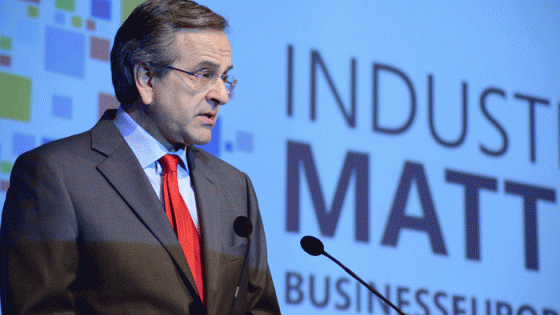- UEPrésidence grecque
Discours d'orientation par le Premier ministre Antonis Samaras à l'évènement BusinessEurope (Bruxelles, 28/01/2014)
Aujourd'hui, mardi 28 janvier 2014, le Premier ministre Antonis Samaras a prononcé un discours d'orientation à l’évènement Journée BusinessEurope intitulé «Questions de l'industrie », qui a eu lieu à Bruxelles. Trouvez ci-dessous le discours du Premier ministre en anglais.
Dear President Schulz, dear Presidents, dear colleagues distinguished Ladies and Gentlemen,
I am glad to be here today. This is a very important event. Indeed “Industry matters”!
Manufacturing is the engine of growth. We sometimes tend to forget it; but this is what history tells us clearly; especially European History…
And not only History! Current reality, reminds us exactly the same thing.
That there is no growth without strong manufacturing.
Manufacturing brings out the highest contribution to productivity. It brings in the largest input in research and innovation. It has the greatest multiplying effects to the overall economy. It amounts for 57% of all EU exports, incorporating 65% of all its R&D. It is, indeed, the key driver for productivity growth, as it follows closely technological evolution and research innovation.
It is the “most real” economy of all. Modern crises do not start from the industrial economy. On the opposite, the manufacturing sector usually suffers from crises generated elsewhere in the economy, primarily from the financial sector.
On the other hand, strong manufacturing usually stimulates a dynamic and resilient financial sector. It is real business, solid business - less ‘bubble’ - more trust!
The current, outgoing, crisis in Europe confirms just that: Countries with a strong industrial sector have been more resilient to the recession.
The impact of globalization in the industrial sector of Europe is a combination of threats and opportunities. This is a great challenge for both business and government.
We have to cover lost ground from our far away competitors. At the same time, we have to explore the immense opportunities for our products to reach markets and customers at exactly those far away markets in other continents.
I would like to say a couple of words for my country. Greece today has the smallest industrial sector compared to its recent history. Deindustrialisation in Greece was widespread in the early 1990s, as a result of the immensely low production cost of its neighboring new democracies in the Balkans, after the collapse of communism. Equally so, our country, although a member of the European Communities since 1980, had failed to introduce structural and market reforms that would stimulate, if they were taken into consideration earlier, real growth in the economy.
The strong financial crisis that hit Greece four years ago only made things much worse. It forced factories with long history to downsize or close down, resulting to record high unemployment and immense social problems.
Our unemployment today is reaching the incredible level of 27% - 28% and around 60% for the youth.
However, this time we reacted decisively. Our government has implemented extensive structural reforms aiming at transforming a local-demand driven production to an export oriented economy. We have implemented fiscal, labor and market reforms. We have facilitated licensing, we have done a large reform in the public and tax administration which directly affects business and encourages foreign investment. Our bureaucracy today is in fact being transformed from a red tape to a red carpet treatment, especially to foreign investment.
We are very optimistic today. According to all official statistics and surveys by the European Commission, the IMF and the OECD, Greece today has the largest cyclically corrected primary surplus (of over 6%) and the largest structural surplus, compared to an average structural deficit for the eurozone as a whole! On top of that, our trade deficit was brought down from 15% of GDP by 2009, to zero last year, for the first time in decades! We had a double problem of a deficit. We now have a primary surplus and a surplus in the balance of payments for the first time in many decades.
Allow me to move to the broadest picture: The greatest challenge for the European industry is how to deal with competition from regions where the manufacturing sector carries a much lighter labour, social and tax regulatory regime. This is what has caused some 4 million lost jobs since 2008 and the decrease of private investment by 350 billion between 2007-2011, driving unemployment upwards and threatening the social fabric of our Union.
Europe has been seriously affected by the crisis and challenged by competition from emerging markets. The Industry’s share of European GDP has slightly dropped to 15.1% in 2013, versus the goal of 20% in 2020. It suffers from an expensive Euro, which holds down its exporting potential to the rest of the world. Access to finance for small businesses has become increasingly scarce. A very diverse cost of lending in different areas of the European Union, I believe, is distorting competition and is increasing asymmetric differences within the euro area. It is a huge difference from an SME in Greece or in Portugal or in Ireland we have to pay 10% or 11% from an SME that pays 1% or 1,5%.
During the past 10 years, Europe became a less popular place to do business. The drop of foreign investment to almost half of what it used to be in the early 2000s, indicates a very thorny problem. Thus, the need for Europe to react and strengthen its global position is to me imperative.
The bottom-line is that we have to reverse the negative trend, while maintaining our quality advantages!
Since we have the best social model in the world, we have to create the best products in the world. They might be more expensive sometimes, but they should always be better in quality and innovation.
Our European products have to be “the best value for money”, compared to similar products produced elsewhere. This is called, I believe, “competitiveness”! We don’t necessarily have to compete for the lowest price. But we certainly have to produce “the best value for money”.
This simple logic carries a whole chain of implications. Because it demands as a prerequisite to have the best education system, linked to the real economy, as well as the best R&D infrastructure as our president of our Parliament indicated. As an old member of the Committee of budgets myself in the Parliament, I fully agree with Schulz, who insisted on R&D. Of course also on the problem of regulation, trade strategy and worker’s skills. This logic also requires the existence of companies of variable sizes to be able to innovate and lead. Regaining success in the global industrial competition implies that in some sectors we need bigger companies while in other sectors we need smaller companies to face non-European competition.
During this semester, ladies and gentlemen, The Greek Presidency comes at a transition period for Europe. Indeed, we are all on the road to recovery, from an acute crisis, which has, I have to say, however, helped Europe change the most since Maastricht! As the Foreign Minister of my country I was there and I am the one who signed the Maastricht agreement. And I have to tell you that this is the first time that Europe is really changing. And I believe that is why we are fully anchored with the Vice President’s Tajani initiative for the “Industrial Compact”. It will complement the “Compact for Growth and Employment”, as well as, the “Fiscal Compact”, so that we can attain the objectives of the “Europe 2020” strategy.
The report BusinessEurope has presented here today, is a comprehensive policy paper with clear cut policy recommendations for such an “Industrial Compact”. Your proposals cover both the European institutions and the member states.
Let me underline just one thing here. Industrial policy is not – I repeat not – “a soviet type 5year plan”, as some of the critics maintain. The interaction of market forces with the private sector is indeed our understanding of “sustainable growth”.
Industrial policy should make sure that we keep all our competiveness advantages at all levels and all sectors in our internal market.
“Industrial policy” is all about providing the conditions for our investors and our businessmen and our workers and our researchers and our banks and our consumers to make the best choices to maintain our standards and improve our position in world competition.
And it is also a vehicle for closer integration within the European Union.
So, we need to go beyond “conventional wisdom”. We have to start thinking “out of the box”. We have to move beyond the codifications of the existing tools.
Thus “Industrial Compact” addresses the leadership challenge of the European Union in the field of manufacturing. Now that Europe draws its lessons from the outgoing crisis.
The European Council of March 2014, in couple of months, will be crucial for a fruitful debate which will define a clear strategy regarding Industrial Policy and competiveness. Our purpose will not be only to exchange views, but also to decide measures which will strengthen both the business environment and industrial competitiveness in Europe.
The Hellenic Presidency will aim to bring tangible results:
1- By addressing the high cost of energy and the lack of a unified energy market. I believe this is a high priority. We need to mitigate the negative impact of the high cost of energy, twice higher than the USA, Russia while especially E.U. gas is three to four times more expensive than for the USA, the Russian and the Indian competitors.
2- By addressing the high cost of bureaucracy by improving the business environment; identifying burdensome legislation, while also simplifying and stabilizing the tax system.
3- By improving financial access and addressing the consequent lack of liquidity, especially for SME’s. We strongly believe that specialized financial instruments for industry need to be developed in cooperation with the EIB and the EIF.
4- By stimulating investment in innovation, in conjunction with the digital agenda;
5- By investing in knowledge economy and new skills, an element of paramount importance in identifying new growth prospects.
6- By deepening the notion of a single market, which is also imperative both for maximizing the potential of the internal market and for exploiting opportunities in the global market.
Europe is coming out of this crisis stronger and, I believe, wiser. We have to untap our potential in global competition. No other continent is the birthplace of modern civilization, the mother of all sciences, the birthplace of democracy, the ideal place to live and prosper.
Our products carry this fame as an intrinsic value. Europe is by definition a very strong brand name. We absolutely have to make the most out of it.
Thus manufacturing must indeed be placed at the center stage of Europe’s economic recovery.
We do believe in ourselves. We do believe in our potential.
We can exceed our own expectations.
I am sure the sky is our limit and I hope to see you in your next meeting in Athens. I will see you there in the beginning of May.
Again, thank you very much!









